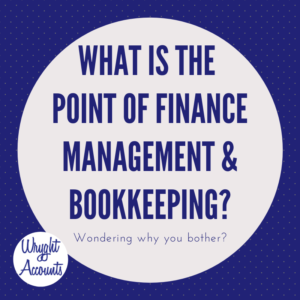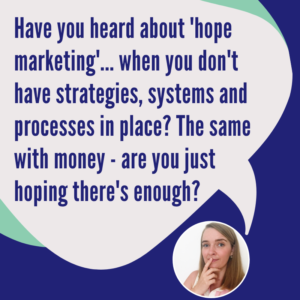Running a business and financial management aren’t things we are taught at school, right now though you’re probably thinking that would have been more useful that learning to measure the angles on shapes with a varying number of sides or drawing a circle inside a triangle (who can even remember why).
So for a lot of creative business owners the reasons and benefits of bookkeeping pretty mysterious. You make sales, you buy supplies and services and you hope there’s money left in your account at the end of the day.
Well, that’s the first reason we manage our finances, I read about ‘hope marketing’ somewhere, just putting it out there with no strategy, no methodology and hoping that someone will buy. Hoping there’s money left in your account at the end of the day – ‘hope money management’.
Good financial management puts your income numbers into context, yes we can aggregate and analyse and dissect, but the most important thing is KNOWING (not guessing, not assuming, not hoping) there’ll be enough money to pay ourselves, invest back into the business, buy the next round of supplies or services, and cover our tax obligations.
If you’re thinking right now, but Claire it isn’t possible for me to do ALL of those things with my sales, then I’m going to guess you’re living on ‘hope finance’. Mismanagement (or zero management) of cash flow is a major reason businesses get into strife and constantly putting personal money into your business probably indicates a hobby rather than a business. Sorry, harsh but true.
The second thing that we do bookkeeping and business finance for is probably the most obvious, because the Australian Tax Office say we have legislative obligations. There really isn’t a way around this one. Maybe you’re an amazing saver, a savvy spender, or frugality is your middle name and you can muddle through managing your cash flow. But at some point you have to report your business income and various categories of expenses to the tax office. It’s not really an outright benefit other than keeping the tax office at bay.
The last thing I’ll cover today is information – keeping detailed records gives you so much information on your business – you might just need some guidance on where to look, what to look at and how to utilise the information. Information is a whole other blog and funnily I wrote one a while back called Five Ways Bookkeeping Helps Your Business with more emphasis on what you can do with the information that bookkeeping generates.
Bookkeeping in particular records the outputs of your business, the results it generates and it doesn’t just have to be financial information. What about analysing your sales information to see which products are the most popular? Or the sales trends over the course of a year to see where a discount sale might help boost income in a slower month. Tracking costs to compare which products are most profitable because it’s not necessarily your highest volume item or the one you promote the most?
Have I convinced you yet?
If I have, or maybe you didn’t need convincing to start with, but you’re still a bit stumped on how to get it all working (or where to get started). Then I have a little something help that might be of interest.
What if rather than trying to push through and sort out everything and all at once, trying to do all the things, you had a specific plan? That’s what my Money Management Mapping session is all about. We take a look at your business and how you handle the financial aspects and see where we can get make the biggest difference. That could be optimising or streamline, setting up something to integrate or even reviewing your pricing. You walk away with an action plan to help you get more out of your business. Email me at wryghtaccts@gmail.com if you have questions or book now at bit.ly/bookwryghtaccounts
Watch the Video
Pin for Later


